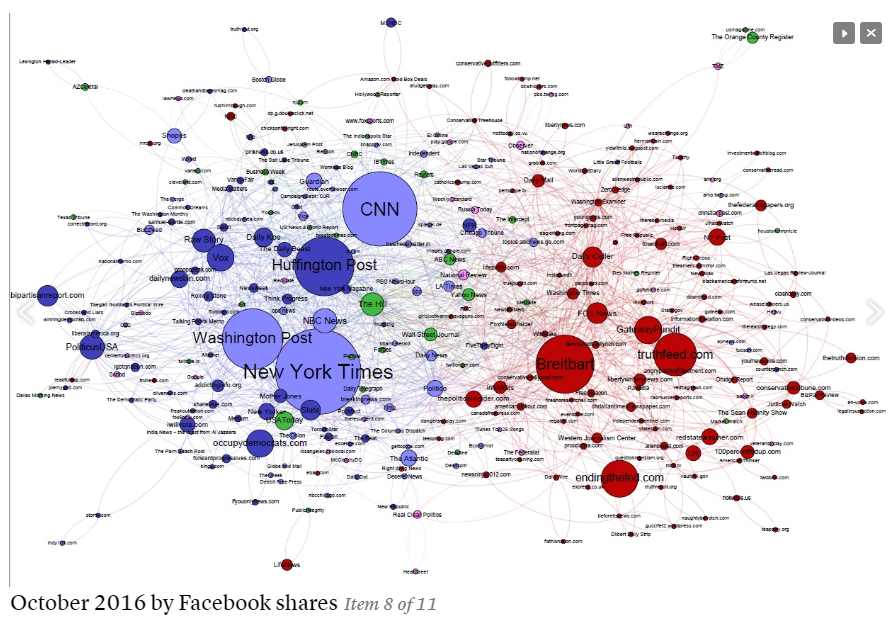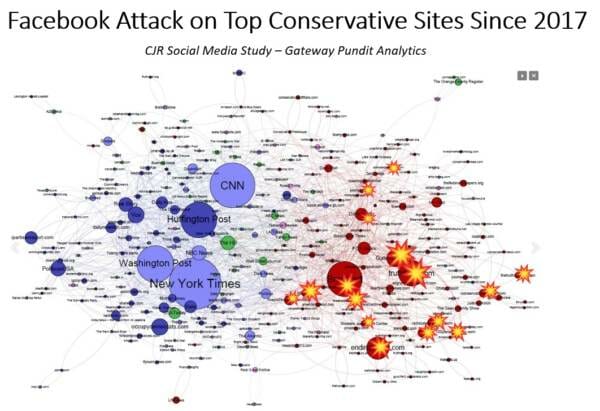Most news sites might not think to take another site’s data map, superimpose sticker-like graphics over it and pass it off as independent analysis. But most journalism organizations aren’t The Gateway Pundit, a conservative misinformation peddler that generously describes itself as “more accurate than The New York Times, Washington Post, CNN and MSNBC.”
Yesterday The Gateway Pundit did its part to perpetuate the myth of politically-motivated censorship on social media platforms, couching this non-existent situation as an emergency. This post precedes a White House summit on social media that is expected to focus on unfounded allegations that tech companies suppress conservative voices.
Your map is my map
Two years ago, Columbia Journalism Review published a report from researchers at Harvard University’s Berkman Klein Center for Internet and Society, which analyzed 1.25 million news stories from 25,000 sources from April 2015 through the 2016 presidential election. The study found that social media was the “backbone” of a conservative media network built around far-right site Breitbart. According to the research, this insulated network, which included Gateway Pundit, set the agenda for conservative media and influenced overall news coverage during the election.
The study said that conservative media’s most-shared stories were products of disinformation that allowed politicians and the government to freely share falsehoods with the public.
“Over the course of the election, this turned the right-wing media system into an internally coherent, relatively insulated knowledge community, reinforcing the shared worldview of readers and shielding them from journalism that challenged it,” the report said.
In a post from last year, The Gateway Pundit linked to the study and claimed inaccurately that it ranked Gateway Pundit the fourth-most influential news source during the 2016 election. Neither report had such a ranking, but the Berkman Klein Center’s version said that the publication was among seven partisan media outlets that received more attention on social media than outside links from other media outlets. Out of this group, the report said, “Gateway Pundit is in a class of its own, known for ‘publishing falsehoods and spreading hoaxes.’”
All of this brings us to the altered map. First, here’s what the original looks like.

Gateway Pundit labeled this map to claim it depicts the “top conservative influencers in 2016,” when the map only covers the month of October for that year and the influence in this case only applies to shares on Facebook.
Here’s Gateway Pundit’s new version of the data map, which the site also published in February.

You’ll notice the map is exactly the same, except for a few things. First, there are the adorable graphics of tiny explosions that the Gateway Pundit pasted over 16 conservative sites with no explanation for how they were selected. Each wee explosion is supposed to represent a conservative site that Facebook has supposedly censored since 2017. The revised map doesn’t appear to be backed up with data, except for the Berkman Klein Center’s numbers, which are all wrong, since it’s not October 2016 any more.
Fact or fiction: Has Facebook killed traffic to conservative websites since the 2016 election?
A Gateway Pundit post from last year reported that conservative sites had a 93 percent drop in traffic. Regardless of whether or not that is accurate, the problem is far broader than Gateway Pundit and other partisan sites are letting on. Facebook’s algorithm revisions, especially those made since 2018, have wrecked traffic from Facebook for every news organization, whether they’re to the left, right or nonpartisan.
A Chartbeat analysis found that after an algorithm reboot, Facebook traffic declined 15 percent in 2017, then another 6 percent just in the first month of 2018. A month later, Facebook unveiled perhaps its most damaging algorithm, which was engineered as the social media platform faced rampant criticism for political polarization and misinformation. Facebook’s solution was to dodge those issues by reducing the presence of news in everyone’s feed.
By May 2018, Chartbeat reported mobile direct traffic had exceeded Facebook traffic for the first time. And tellingly, five months later, Chartbeat shared data showing that publishers’ traffic actually went up during a Facebook outage.
Fact or fiction: Have President Donald Trump’s supporters been “largely silenced” on Facebook?
No. Take, for example, the video from May of House Speaker Nancy Pelosi that was doctored to make her appear drunk. That video, posted by a pro-Trump Facebook page, received at least 2.8 million views.
Fact or fiction: Are social media and other tech companies working “diligently and cooperatively to eliminate conservative voices online”?
There’s no tangible evidence this is happening, just as there’s no evidence of tech companies discriminating against conservatives.
Fact or fiction: Did Project Veritas prove Google is manipulating search results?
If Gateway Pundit is a young Lauren Bacall, Project Veritas is a world-weary Humphrey Bogart, a chain-smoking cynic who unflinchingly investigates the world’s most confounding mysteries. Well, sort of. Like Gateway Pundit, Project Veritas’ content has serious factual issues that include regularly misrepresenting information in a way that misleads the site’s audience.
Project Veritas’ video on Google from last month doesn’t contain evidence that the search engine is stacking the deck for search results. It relies on a video of a Google employee that Project Veritas taped without her consent and irrelevant details presented as though they’re a smoking gun. For instance, the Google video made a show of how the search engine autofills queries for Trump vs. Hilary Clinton, but the autofill results weren’t discriminatory in any way.
Note: American Mythology is a series where we factcheck an entire piece or debunk a topic across multiple publications or platforms. You can learn more about our approach to factchecking here.
Contact Mollie Bryant at 405-990-0988 or bryant@bigiftrue.org. Follow her on Facebook and Twitter.
We’re nonpartisan and nonprofit. Support Big If True.
